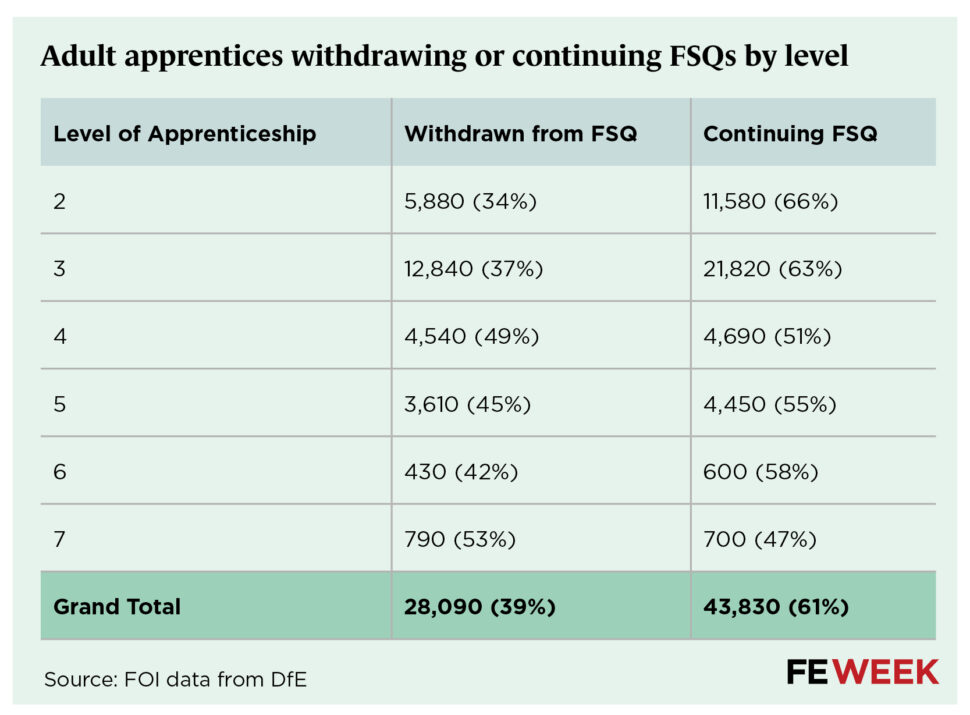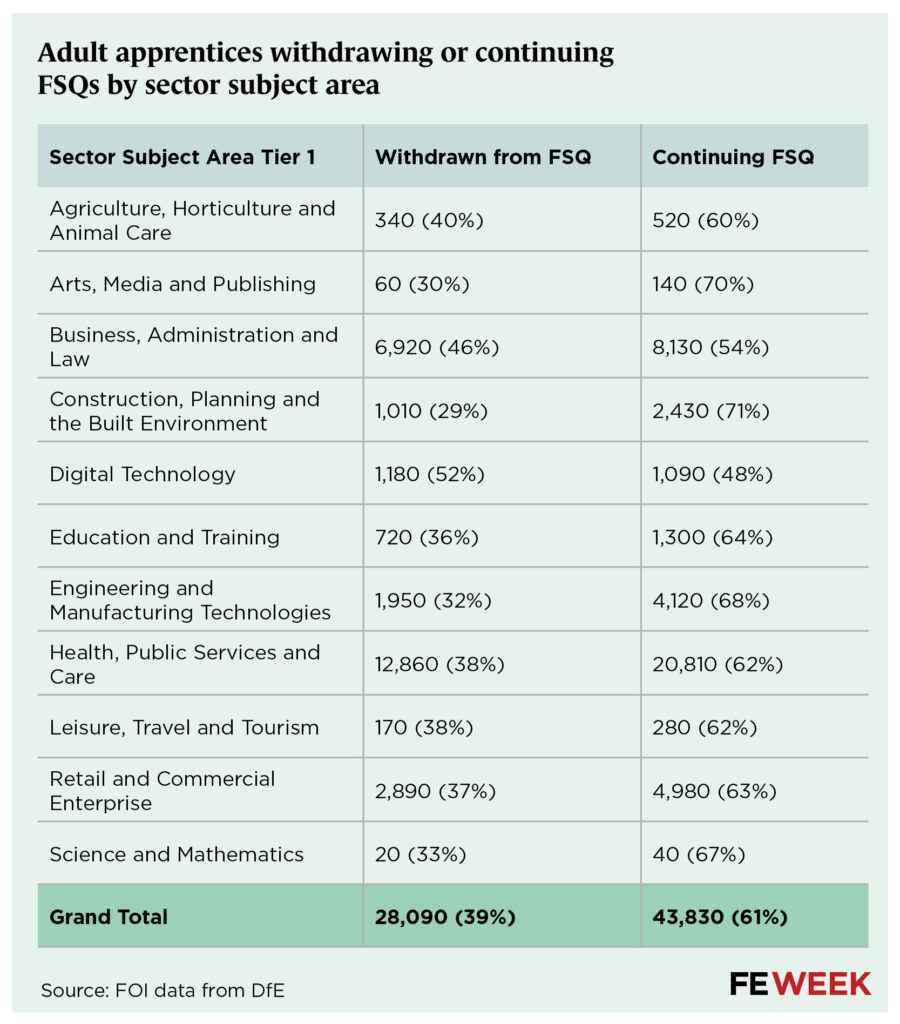Most adult apprentices are still studying for English and maths exams despite no longer being required to do so by the government, FE Week can reveal.
Ministers announced on February 11 that an exit rule, which forces apprentices without a GCSE pass to achieve a functional skills qualification in the core subjects to complete their training, was scrapped with immediate effect for those aged 19 or older.
Employers, training providers and apprentices were given a deadline of April 1 to decide whether to continue or stop English and maths study and update individual training plans.
Exclusive data, obtained by FE Week through a Freedom of Information request from the Department for Education, showed that of the 73,460 on-programme adult apprentices who were working towards at least one functional skills qualification at the time of the policy change, 43,830, or 60 per cent, had continued.
Another 1,540 (2 per cent) were on a break in learning, and 28,090 (38 per cent) had withdrawn from English and maths study.
Stephen Evans, chief executive of Learning and Work Institute and a member of the English and Maths Coalition, said: “It’s good that 60 per cent of apprentices are continuing with functional skills, but disappointing that 40 per cent aren’t and that most future adult apprentices won’t have this focus.
“While some sectors will have built high levels of English and maths into their apprenticeship standards and so feel they don’t need separate qualifications, we are concerned too many apprentices will be missing out on skills that are vital to their future lives and careers.”

Construction highs and digital lows
The DfE removed the functional skills exit requirement for adult apprentices in response to lobbying from parts of the sector, amid claims the rule was one of the biggest barriers in the apprenticeship system, causing stress for learners and high drop-out rates.
Estimates released this week by the DfE showed officials believe there will be between 6,800 and 10,200 additional achievements per academic year now the rule has been relaxed.
It is not yet clear what proportion of new starters, who would have been in scope of the functional skills exit requirement, are opting in or out of the courses.
For existing on-programme adult apprentices, FE Week’s FOI data showed level 2 and 3 apprenticeships had the biggest proportion of learners continuing with functional skills at 66 per cent and 63 per cent respectively.
Level 7 apprenticeships had the lowest proportion at 47 per cent, followed by level 4 at 51 per cent.

The DfE also provided FE Week with a breakdown by sector subject area.
Only digital had fewer than half (48 per cent) of apprentices choosing to continue functional skills. Business, administration and law had the next lowest at 54 per cent.
Seven other subject areas were in the 60 to 69 per cent bracket, while arts, media and publishing hit 70 per cent, and construction, planning and the built environment was 71 per cent.
Large digital apprenticeship provider QA Ltd told FE Week that only around 325 (25 per cent) of its 1,300 on-programme adult apprentices had opted to complete their functional skills.
A QA spokesperson said this was “driven by a mix of individual learner motivations and decisions made by our customers and varies significantly across learner demographics”. Those who have chosen to continue have done so because they want to “update and consolidate long-dormant skills”, for example.
JTL, which specialises in apprenticeships for electricians and plumbers, has 85 per cent of its 400 in-scope adult apprentices continuing with functional skills.
The provider’s operations director Clair Bradley said: “English and maths qualifications remain important in the building services engineering sector. For example, electrical apprentices are required to calculate voltage and power using formulas and, in both electrical and plumbing standards, learners study high-level scientific principles.
“A very small number of our apprentices have chosen not to complete their functional skills assessments in consultation with their employers (62 of an eligible cohort of 400), reflecting their specific individual or professional needs.”

‘Decent’ English and maths a ‘big enabler’ for businesses
Jill Whittaker, executive chair of hospitality apprenticeship provider HIT Training, told FE Week that over 80 per cent of her provider’s 4,000 adult apprentices were continuing with functional skills.
She said HIT has “always contextualised our teaching of literacy and numeracy for the sectors we operate in” which has led to higher success rates than the national average.
Most learners “really appreciate how important it is to them and to their lives” and the “vast majority of employers” HIT works with “see decent English and maths as a big enabler for their businesses and wanted to keep it in their apprenticeships as long as the apprentice was in agreement”, Whittaker added.
FE Week’s FOI data showed that similar proportions of female and male apprentices chose to continue with English and maths, at 60 and 63 per cent respectively. And 61 per cent of apprentices with learning difficulties have continued with the subjects, which was the same proportion for apprentices without a learning difficulty.
Simon Ashworth, deputy CEO of the Association of Employment and Learning Providers, said: “This early data suggests that apprentices are keen to continue studying maths and English as part of their apprenticeship, which is encouraging, given the value these subjects bring.
“The key change is that maths and English no longer act as a barrier to completion for adult learners; a shift we should aim to replicate for younger apprentices to ensure we avoid the unintended consequences of a two-tier system.”
















You could drive a coach and horses through the published ‘transparency’ data
“Apprenticeship Achievement Rates – indicative rates for English and/or maths learners”.
It’s a list of standards showing starts (23/24), with the % of those doing English and/or maths. Alongside the QAR for 22/23 and the E&M indicative achievement rate, presumably to give an appreciation of any gap.
There are close to 700 standards – this list is 136 long…
Rounding the data, and losing the most of data and the meaning, is wholly unnecessary to prevent disclosure. Especially when underlying starts and achievement data is unrounded and contains granular location and age band! (data loss from Null values can also be easily avoided..)